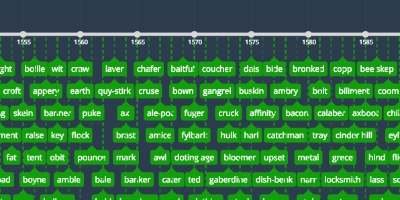jan 1, 1583 - grece
Description:
At the root of these words is ‘gree’, a Middle English term for ‘step’ that is said to be obsolete in England. Apparently it still survives in Scotland where it has the sense of ‘first place’. It derives from Old French, and can be compared with ‘degree’. ‘Grece’ was therefore a plural, referring to steps or a flight of steps, and it is found commonly from before 1300: a ‘grece’ mentioned in the <i>Cursor Mundi</i> had ‘steppis fijftene’. In Ripon in 1396-7 a carpenter was working on <i>j cameram et j grece</i> (SS81/125) and in a Stokesley will of 1497 a gentleman asked to be <i>beried in the qwer … at the grece befor Saint Petyr</i> (SS53/128). Elsewhere there is a reference in 1499 to <i>standinge at the chaumbre grecefotte</i>, Wighill (SS53/160) and in 1501 <i>to a grece</i> ... <i>festened unto a tenement</i>, York (SS85/22). It was the usual word for the space at the head of the staircase: 1558 <i>one standing bed stede being in the grecehed chamer,</i> Great Smeaton (SS26/123); 1583 <i>In the chamber over grese head</i>, Ripon (SS64/380). The double plural ‘greces’ is also on record throughout much the same period: 1485 <i>the Mynster gresses</i> in York (SS35/262). The word occurred in numerous minor place-names, some of which survive. These probably include Greestone Stairs, the steep alley in Lincoln that runs between the cathedral and Lindum Hill.Added to timeline:
Date:
jan 1, 1583
Now
~ 442 years ago
